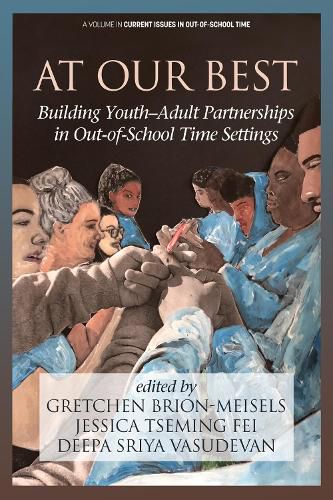Readings Newsletter
Become a Readings Member to make your shopping experience even easier.
Sign in or sign up for free!
You’re not far away from qualifying for FREE standard shipping within Australia
You’ve qualified for FREE standard shipping within Australia
The cart is loading…






This title is printed to order. This book may have been self-published. If so, we cannot guarantee the quality of the content. In the main most books will have gone through the editing process however some may not. We therefore suggest that you be aware of this before ordering this book. If in doubt check either the author or publisher’s details as we are unable to accept any returns unless they are faulty. Please contact us if you have any questions.
At Our Best: Building Youth-Adult Partnerships in Out-of-School Time Settings brings together the voices of over 50 adults and youth to explore both the promises and challenges of intergenerational work in out-of-school time (OST) programs. Comprised of 14 chapters, this book features empirical research, conceptual essays, poetry, artwork, and engaged dialogue about the complexities of youth-adult partnerships in practice. At Our Best responds to key questions that practitioners, scholars, policymakers, and youth navigate in this work, such as: What role can (or should) adults play in supporting youth voice, learning, and activism? What approaches and strategies in youth-adult partnerships are effective in promoting positive youth development, individual and collective well-being, and setting-level change? What are the tensions and dilemmas that arise in the process of doing this work? And, how do we navigate youth-adult partnerships in the face of societal oppressions such as adultism, racism, and misogyny? Through highlighting contemporary cases of authentic youth-adult partnerships in youth programs, this fourth volume of the IAP series on OST aims to introduce, engage, and sharpen educators’ understandings of the power and promise of these relationships. Together, the authors in this volume suggest that both building youth-adult partnerships and actively reflecting on intergenerational work are foundational practices to achieving transformational change in our OST organizations, schools, neighborhoods, and communities.
$9.00 standard shipping within Australia
FREE standard shipping within Australia for orders over $100.00
Express & International shipping calculated at checkout
Stock availability can be subject to change without notice. We recommend calling the shop or contacting our online team to check availability of low stock items. Please see our Shopping Online page for more details.
This title is printed to order. This book may have been self-published. If so, we cannot guarantee the quality of the content. In the main most books will have gone through the editing process however some may not. We therefore suggest that you be aware of this before ordering this book. If in doubt check either the author or publisher’s details as we are unable to accept any returns unless they are faulty. Please contact us if you have any questions.
At Our Best: Building Youth-Adult Partnerships in Out-of-School Time Settings brings together the voices of over 50 adults and youth to explore both the promises and challenges of intergenerational work in out-of-school time (OST) programs. Comprised of 14 chapters, this book features empirical research, conceptual essays, poetry, artwork, and engaged dialogue about the complexities of youth-adult partnerships in practice. At Our Best responds to key questions that practitioners, scholars, policymakers, and youth navigate in this work, such as: What role can (or should) adults play in supporting youth voice, learning, and activism? What approaches and strategies in youth-adult partnerships are effective in promoting positive youth development, individual and collective well-being, and setting-level change? What are the tensions and dilemmas that arise in the process of doing this work? And, how do we navigate youth-adult partnerships in the face of societal oppressions such as adultism, racism, and misogyny? Through highlighting contemporary cases of authentic youth-adult partnerships in youth programs, this fourth volume of the IAP series on OST aims to introduce, engage, and sharpen educators’ understandings of the power and promise of these relationships. Together, the authors in this volume suggest that both building youth-adult partnerships and actively reflecting on intergenerational work are foundational practices to achieving transformational change in our OST organizations, schools, neighborhoods, and communities.